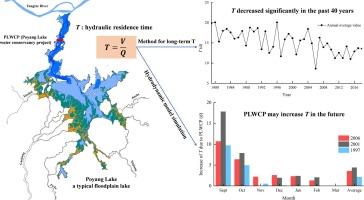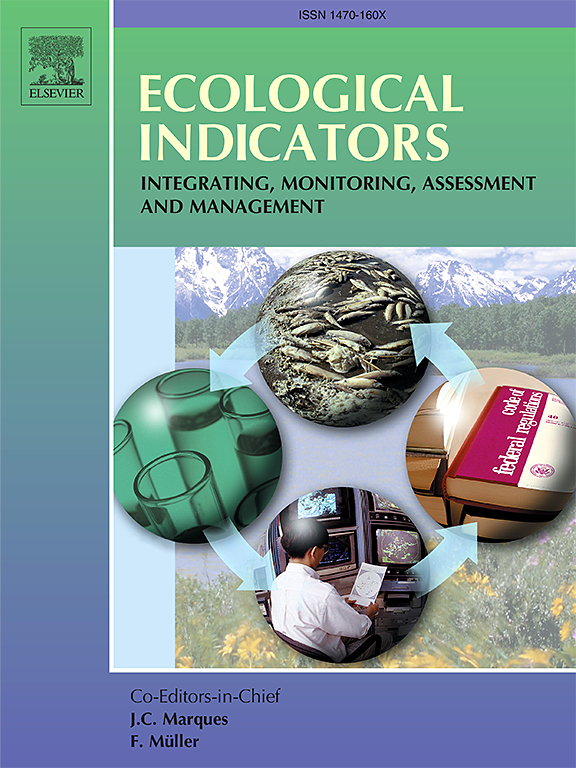Long-term variations in hydraulic residence time of floodplain lakes and their response to water conservancy projects
IF 7
2区 环境科学与生态学
Q1 ENVIRONMENTAL SCIENCES
引用次数: 0
Abstract
Hydraulic residence time, a key indicator to evaluate the hydrodynamic processes of a lake, especially a floodplain lake, critically affects environmental processes such as water self-purification and algal transport. The hydraulic residence time of Poyang Lake in the east of China, a typical floodplain lake, exhibits significant and complicated variations. Focusing on Poyang Lake, this study adopted the hydraulic data from 1979–2018 to calculate the hydraulic residence time of the lake. Different methods, such as the Mann–Kendall method and hydrodynamic modeling, were used to reveal the long-term variations in the hydraulic residence time and explore the reasons for these variations. Subsequently, this study predicted the possible effects of the planned water conservancy project on the hydraulic residence time of the floodplain lake. The main results can be summarized as follows: (1) In the past 40 years, the annual average hydraulic residence time of Poyang Lake varied between 8.6 and 20.1 d, with a significant reduction noted. Furthermore, the monthly average hydraulic residence time decreased considerably, with the decline in July–September being the most significant. (2) The annual average outflow rate of Poyang Lake increased insignificantly, while the annual average lake volume decreased significantly, which were possibly the main reasons for variations in the annual average hydraulic residence time. (3) In the future, with the planned Poyang Lake water conservancy project (PLWCP), the low water level of the lake is expected to be compensated for by increasing the water level during the regulation period; thus, the hydraulic residence time of the lake would be extended. The findings of this study could deepen the understanding of the hydrodynamic characteristics of floodplain lakes and their responses to water conservancy projects; they could also provide technical foundations for water resource management and environmental protection of floodplain lakes.

洪泛区湖泊水力停留时间的长期变化及其对水利工程的响应
水力停留时间是评价湖泊(尤其是洪泛平原湖泊)水动力过程的关键指标,对水体自净和藻类迁移等环境过程具有重要影响。中国东部鄱阳湖是典型的洪泛平原湖泊,其水力停留时间呈现出显著而复杂的变化。本研究以鄱阳湖为研究对象,采用 1979-2018 年的水力资料计算鄱阳湖的水力停留时间。采用 Mann-Kendall 法和水力学模型等不同方法揭示了水力停留时间的长期变化,并探讨了变化的原因。随后,本研究预测了规划中的水利工程对洪泛湖水力停留时间可能产生的影响。主要结果可归纳如下:(1)近 40 年来,鄱阳湖的年平均水力停留时间在 8.6 至 20.1 d 之间变化,并有明显的缩短。此外,鄱阳湖月平均水力停留时间也有较大幅度的下降,其中以 7-9 月下降最为显著。(2)鄱阳湖年平均出湖率增加不明显,而年平均湖泊容积却明显减少,这可能是造成年平均水力停留时间变化的主要原因。(3) 未来,随着鄱阳湖水利枢纽工程的实施,湖泊低水位有望在调节期通过提高水位得到补偿,从而延长湖泊的水力停留时间。本研究的结果可加深对洪泛平原湖泊水动力特性及其对水利工程响应的理解,并为洪泛平原湖泊的水资源管理和环境保护提供技术基础。
本文章由计算机程序翻译,如有差异,请以英文原文为准。
求助全文
约1分钟内获得全文
求助全文
来源期刊

Ecological Indicators
环境科学-环境科学
CiteScore
11.80
自引率
8.70%
发文量
1163
审稿时长
78 days
期刊介绍:
The ultimate aim of Ecological Indicators is to integrate the monitoring and assessment of ecological and environmental indicators with management practices. The journal provides a forum for the discussion of the applied scientific development and review of traditional indicator approaches as well as for theoretical, modelling and quantitative applications such as index development. Research into the following areas will be published.
• All aspects of ecological and environmental indicators and indices.
• New indicators, and new approaches and methods for indicator development, testing and use.
• Development and modelling of indices, e.g. application of indicator suites across multiple scales and resources.
• Analysis and research of resource, system- and scale-specific indicators.
• Methods for integration of social and other valuation metrics for the production of scientifically rigorous and politically-relevant assessments using indicator-based monitoring and assessment programs.
• How research indicators can be transformed into direct application for management purposes.
• Broader assessment objectives and methods, e.g. biodiversity, biological integrity, and sustainability, through the use of indicators.
• Resource-specific indicators such as landscape, agroecosystems, forests, wetlands, etc.
 求助内容:
求助内容: 应助结果提醒方式:
应助结果提醒方式:


